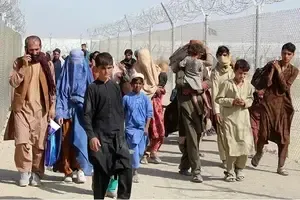Pakistani Authorities in Disarray as Deadline for Afghan Refugee Deportation Looms

Synopsis
Key Takeaways
- Pakistan's March 31 deadline for Afghan refugee deportation creates confusion.
- No official guidelines have been issued by the government.
- Afghan officials call for a dignified and gradual repatriation process.
- Human Rights Watch criticizes forced deportations and harassment.
- Many Afghans fear detention upon returning to Afghanistan.
Islamabad, March 21 (NationPress) The government of Pakistan has failed to establish any guidelines as the deadline for the mass deportation of Afghan refugees approaches in just ten days, leaving relevant agencies in a state of confusion. The Afghan Commissionerate, which oversees Afghan refugees under federal administration, has reportedly not received any official directives from the government, as per media reports.
Reports from The Express Tribune indicate that the Pakistani government has not communicated any instructions to the relevant authorities concerning the repatriation process, causing a significant level of uncertainty.
Pakistan has set a firm deadline of March 31 for the expulsion of all Afghan refugees. However, many Afghans are hoping for an extension. With the relationship between Pakistan and Afghanistan at a low point, the Foreign Office has confirmed that the deadline remains unchanged.
Earlier this week, Afghan Foreign Minister Amir Khan Muttaqi called for a gradual process for repatriating Afghan refugees. Speaking at an iftar gathering in Kabul attended by Pakistani Charge d’Affaires Ubaidur Rehman Nizamani, he noted that millions of Afghans have migrated to various countries, including Pakistan and Iran, over the last four decades.
“Refugees deserve respect, and their return should be gradual and dignified. There are challenges that complicate the logistics of returning refugees all at once,” reported Dawn, quoting Muttaqi.
Recently, the US-based advocacy group Human Rights Watch criticized Pakistan for its forced deportation practices concerning Afghan refugees. Elaine Pearson, Asia Director at Human Rights Watch, stated, “Pakistani officials should stop coercing Afghans to return home and allow those facing expulsion to seek protection.”
According to the rights organization, Pakistani police have conducted raids, physically assaulted individuals, and unlawfully detained people while confiscating their refugee documentation, including residence permits. They have also been reported to demand bribes for allowing Afghans to remain in Pakistan.
The United Nations has indicated that many Afghans who have returned to their homeland did so out of fear of detention by Pakistani authorities.
Masood Rahmati, an Afghan journalist, emphasized that even Afghans registered with the United Nations High Commissioner for Refugees (UNHCR) or those holding valid residence cards are not safe in Pakistan.
Numerous reports highlight that Afghan refugees are experiencing significant harassment and abuse in Pakistan. They have appealed to various human rights organizations for assistance, expressing that despite possessing valid legal documents, they are at risk of unlawful detention, deportation, and discrimination.









